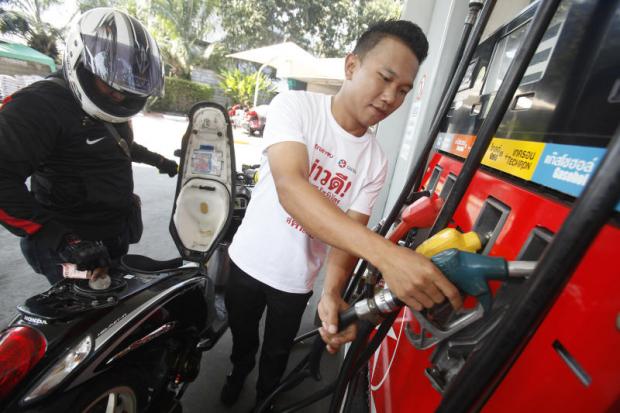
The Energy Policy and Planning Office (Eppo) forecasts the country's energy demand in 2018 will grow by 2.1% to 2.811 billion barrels of oil equivalent per day from all types of fuels, in line with estimated GDP growth of 3.6-4.6%.
Eppo expects oil demand to grow by 2.2%, power demand to increase by 4.1%, coal to grow by 1.2% and renewable energy to gain 7.1%. Compressed natural gas (NGV) is projected to shrink by 1.2%.
Director-general Twarath Sutabutr said Eppo's estimation assumes Dubai crude oil at a range of $52-57 per barrel in 2018, up from an average price of $52.7 per barrel in 2017.
"If no huge international conflict breaks out near major crude oil resources, oil prices in 2018 may not change much from last year," said Mr Twarath.
In a related development, the Department of Energy Business (DOEB) reported yesterday total fuel sales volume in the transport segment rose slightly by 2.56% to 43.2 billion litres in 2017 from 42.1 billion litres in 2016.
Witoon Kulcharoenwirat, the DOEB director-general, said fuel sales last year were well below expectations because the local economy showed flat growth.
He said the growth of fuel sales in Thailand was over 5% per year during 2014-2016 when global oil prices collapsed below $40 per barrel.
The DOEB report noted gasohol E85 recorded the highest sales growth among all types of fuel, with an 18.2% rise to 383 million litres in 2017.
Gasohol E20 sales grew 8.55% to 1.9 billion litres last year.
Gasohol 95 had the highest demand for petrol fuels, with a 9.62% rise to 4.35 billion litres in 2017. On the contrary, gasohol 91 contracted by 4.61% to 3.88 billion litres in 2017.
Diesel sales rose by 2.35% to 22.7 billion litres last year, while jet fuel increased 4.52% to 6.66 billion litres because of the rapid growth of Thailand's tourism sector.
Other petroleum products including liquefied petroleum gas grew by 4.49% to 5.28 billion kilogrammes in 2017.
One petroleum product where sales contracted was asphalt, dropping 3.91% to 1.08 billion kg last year because a massive investment in roads and highway upgrades took place several years ago, causing a contraction last year, said the report.
NGV sales also shrank by 12.3% to 2.46 billion kg as demand declined.
Energy Minister Siri Jirapongphun said although global oil prices have been gaining early in the year, the ministry will no longer use a capped retail oil price because it will not be helpful for the country's economy.